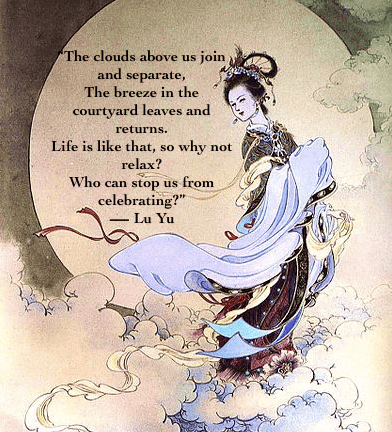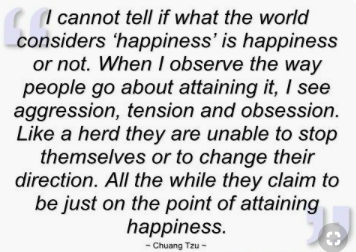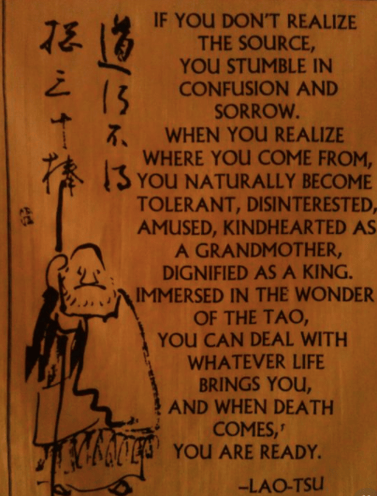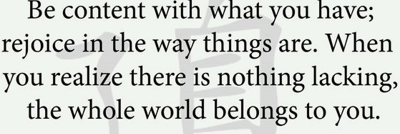The Levels of Happiness
As regards happiness, we all exist on one level or another - what we could call our default level. We bounce up and down a bit, reflecting the natural fluctuation of this life thing, but generally we reside within the level we’ve taken ourselves to.
If we’re on a high level we seek to maintain that level, and if we’re on a lower level, we seek to raise that level. If we can understand what happiness actually is, we can rapidly raise our level because we simply increase the volume of the positive components and decrease the volume of the negative components.
As happiness is something we feel; it’s an experience, obviously we focus on what we’re feeling, and we want to do this directly instead of indirectly. What I mean is; by the time we pop out of the cookie-cutter schooling system, we’re programmed to seek happiness indirectly. We charge off down the mainstream path seeking success as we’re programmed to define it: career, $$, significant other, nice house, nice car etc etc. That’s what we’re seeking, and we kind of assume that we'll be happy - that we’ll feel awesome - after we’ve ticked all those boxes and jumped those hurdles.
We’re seeking happiness indirectly; we’re taking the long road to it, and we’re just assuming that investing the vast bulk of our time and energy jumping those hurdles will deliver a high level of happiness. For some, it does, and for them, there’s no problem. But, that mainstream path is becoming increasingly barren; it’s nowhere near as fruitful as it was just a few short decades ago. Think about how much $$ - how much work - is needed just to own a house these days. The mainstream path used to be an easy, fruitful amble. Folk worked their 40-hour week, 20% of their wages covered their mortgage, another 30% their living expenses, and the rest was spent on enjoying their ample free time. The rest just grew in the bank. Easy.
But it ain’t like that anymore, and that’s just the reality. The game of life has gotten much harder, and the simplistic - follow the herd - strategy isn’t good enough anymore. That path no longer leads to Nirvana, instead it leads to the slaughterhouse, and so we probably want to pause and ponder before we get caught too deep in that rut..
The good news is, we don’t need a lot to be very happy and needing a lot detracts from our happiness even if we’re successful in ticking all those boxes. Less is more. But less is only more if we understand it to be so and if our ego can accept it. So there’s two challenges; understanding the theory and being able to separate ourselves from our ego. The first is relatively easy, the second often very hard, given we cannot easily undo the many years of intensive schooling that has shaped how we understand ourselves and that has planted most of the motivations within us that drive us down the path we’re on.
For example; Most of us, when we think of the life of a Buddhist monk, or some old guy living in a cave or shack up a mountain think ‘OMG, that would be so boring’ and it would be given the motivations/wants currently within us. But it’s not to them, not at all, as they know their motivations/wants are flexible and changeable. They'll equalise with the environment, and what is more beautiful and simple than returning to nature? Those old guys make their way eagerly up the mountain, as they know they’re heading towards Nirvana They’re not lowering their level of happiness, they’re significantly raising it. We struggle to ‘get it’, because we consider our current motivations as being us, as being something solid and concrete, and not just the programming most of them are. We, or more specifically our ego, is orientated by the set of subjective values we’ve been taught, but we deem them to be objectively true and then don’t look to change them. Take ownership of our motivations, and we’re no longer slaves to them, and we gain the ability to install and uninstall them ourselves.
Once we get to this stage, once we gain that flexibility, it’s all very easy, as we simply mix and match to suit. If we’re feeling frustrated because we’re struggling to satisfy a want, we can just delete that want, we can swap it out for a want/motivation that is easily satisfied given our current circumstances. If there’s plum trees all around us, then if we develop a taste for plums, we’re now very satisfied and content. But to be surrounded by plums, yet wanting peaches is obviously making what could be easy hard. Of course, if, just over the horizon, there’s many peach trees, then sure, we take ourselves there. All that matters is that we match up our motivations with our reality. Do that, and we’re happy and content, our cup is overflowing. It’s not complicated, but we’re programmed to make it very complicated, and so it’s that programming that is the problem. Again, gain control over our programming, and it’s almost impossible to be unhappy for long.
If we know we can just retreat up a mountain, or find a shack at the seaside, and be incredibly happy, how can we ever be too stressed by anything? What can stop us from doing that?Most people don't understand that after a month up the mountain, they'll be a very different person, that 90% of their previous long list of wants has just vanished and now it seems really weird we once wanted those things.
This is core Buddhism; What matters is what we believe matters, and what we seek depends upon what we’re programmed to seek. Shrink all this down, and how is it possible to be unhappy? People become depressed in the midst of plenty; the problem is emotional numbness, the inability to feel joy as they've lost the capacity to connect with that particular frequency. The joy is all around them, it's there and if they took the time, if they emptied out they'd reconnect.
Again, typically, the problem is not that our brains can’t understand this, it’s that our egos can’t accept it. Buddha, just sitting under the tree, was 10/10 happy, yet he had nothing except a bit of food and water. Nothing mattered to him, and so nothing bothered him. He had no ego, he wasn’t judging and categorising reality into ‘good’ and ‘bad’, ‘right’ and ‘wrong’ and then consuming those labels. Tell him he’s fantastic, and he’d shrug and continue smiling. Tell him he’s a loser, and he’d shrug and continue smiling. He’s not motivated to get pats on the head. He’s not trying to be a good boy. He’s just experiencing reality directly on an emotional level. No ego.
When it comes to happiness, there is no level other than the emotional level. Ego is itself emotional, but it gets it's pleasure from a sense of status. It's the cultural understanding of what generates happiness, of what we need to do to deserve happiness. Be a high-performing cog in the machine, and we'll share the bounty the machine produces. This is fine, when it is fine. When it's not, when that mainstream path takes us away from happiness, when need to take the power off Mr Ego and give it back to where it belongs - catering to the bulk of our other emotions.
Humility is the gateway to happiness, while ego locks the gate.






Anyone who is observant will have noticed that very happy people are humble. They have small egos. Conversely, unhappy people tend to have big egos. This is not a coincidence. Humble people are flexible, they’re like bamboo, they just bend with the breeze as it’s just a breeze to them - nothing to get upset about. Unhappy people, on the other hand, do not see the breeze as just a breeze, for them it’s ‘good’ or ‘bad’ and, as they’re judging everything by their own values in the quest for status, they tend to label most of reality as ‘bad’. If it’s ‘bad’ it’s beneath them and thus they feel superior - status. Unhappy people are unhappy because they’ve made the easy hard and they lack flexibility. They cannot change their actions to improve their reality because they’re caught in the straight jacket of their own ego. They cannot experience directly - without labels - because all they see are labels. ‘Good’, ‘Bad’, ‘right’, ‘wrong’, blah blah. Their ego gets nourished, but their deeper emotions become malnourished because their ego is shading them - blocking out the light.
Unhappy people are looking for validation, for pats on the head. They’re dancing for applause and so doing what they think other people will approve. They’ve lost their autonomy. The problem is, everyone is concerned about their own lives. As adults, mum isn’t there anymore. It’s you and the environment and the environment has everything you could want. The question is what do you want and why do you want that? Where has that motivation come from? Is it from you, or is it simply programming others installed in you? To find out, we’ve got to step out of the overgrown and tangled web of motivations. Walk away, and what comes with you belongs and what doesn’t never did. Now we start to have our real identity and we start relating with the environment directly with our emotions, instead of with our ego. The hard is now very easy and we’re very careful about adding extra motivations as that’s just making life harder. Do I really want to spend time and energy chasing that? Why?






We have made quality our habit. It’s not something that we just strive for – we live by this principle every day.








